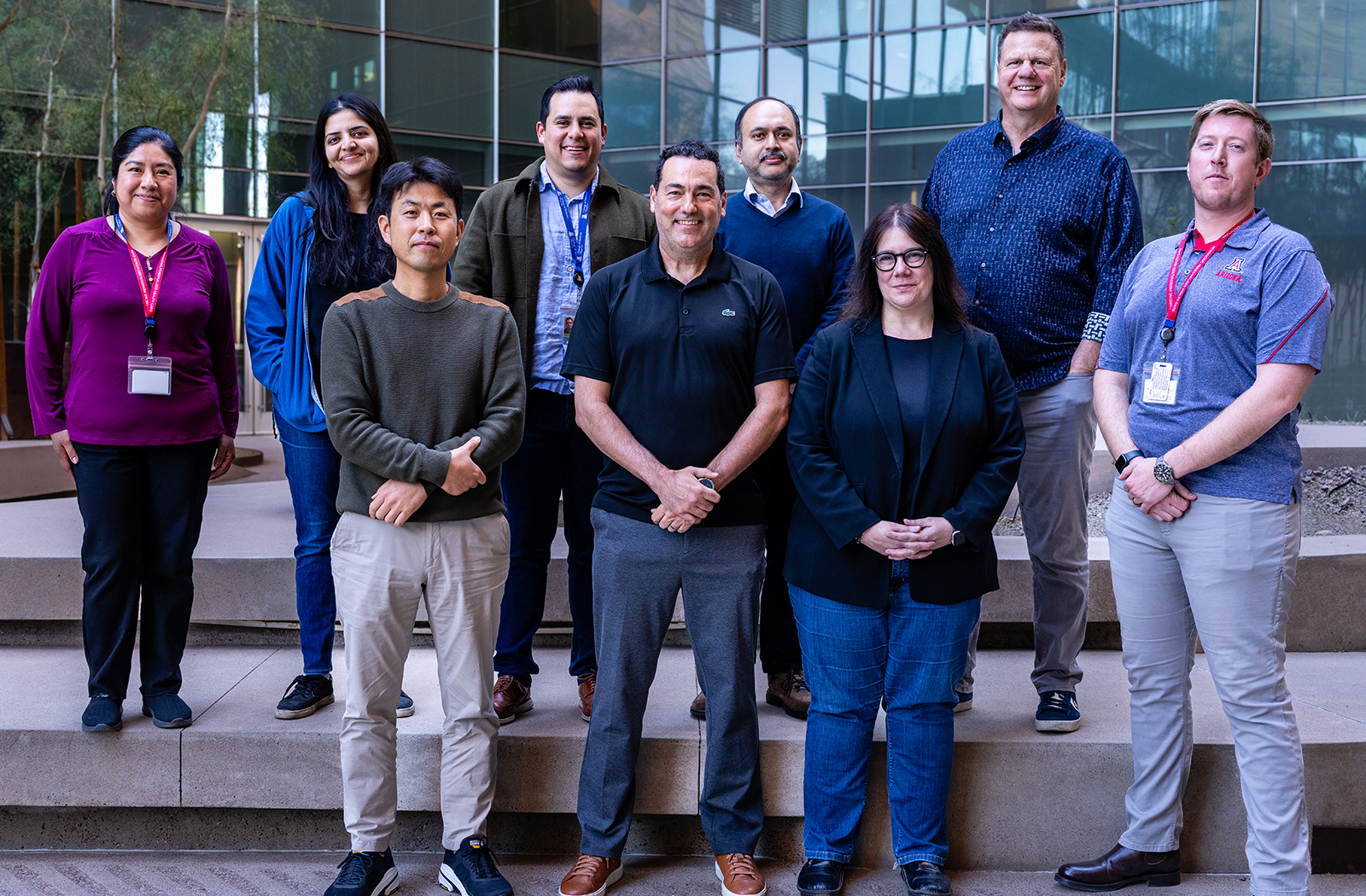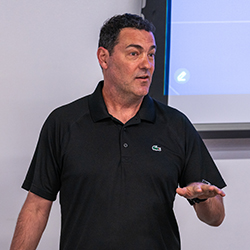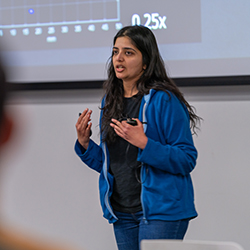
College Hosts Inaugural Phoenix Neuroscience Community Data Blitz

Since its inception, the University of Arizona College of Medicine – Phoenix has prioritized the growth of collaborative research relationships locally, nationally and globally. The hope is that such collaboration will accelerate discovery and to advance health and health care for all.

Hosted at the Phoenix Bioscience Core, the inaugural Phoenix Neuroscience Community Data Blitz epitomized that mission within the broader University of Arizona community, bringing together researchers from across the U of A Health Sciences to share their ongoing work in translational neurosciences.
“The University of Arizona is a national and international leader in neuroscience-related research and health care,” James Bibb, PhD, chair of the U of A College of Medicine – Phoenix’s Department of Translational Neurosciences, said. “We were honored to host the joint data blitz with our colleagues in Tucson as an embodiment of our spirit, teamwork and commitment to make advances in basic, translational, preclinical and clinical research.”
The event, an extension of current offerings from the Neuroscience Graduate Interdisciplinary Program (GIDP), featured eight presentations on an array of subjects within the neurosciences.
Gowri Somasekhar — a Neuroscience graduate student in the lab of Melville Wohlgemuth, PhD, an assistant professor in the Department of Neuroscience at the University of Arizona — presented Eliciting a Sequence of Natural Orienting Behavior in the Bat. Somasekhar’s research focuses on understanding active sensing behaviors. These are behaviors when an animal uses its movement to enhance the sensory information it receives from its environment.
“We humans are very visual in how we process what's in our environment. To enhance the visual information we receive, we constantly move our eyes and head to improve the information,” Somasekhar explained. “In my lab, we use the echolocating bat to study how they use auditory cues from the echoes to guide them in hunting and navigation. We investigate the neural activity in the mammalian midbrain region, Superior Colliculus (SC), using electrophysiology recordings and optogenetic manipulation to understand how SC neurons play a role in this spatial orienting behavior.”
Somasekhar appreciated the chance to present her study at the event. “It was a valuable opportunity to share my work with the Phoenix translational group alongside the Tucson neuroscience community, fostering more vibrant discussions and diverse feedback,” she said.

Melissa Warden, PhD, an associate professor of Translational Neurosciences at the College of Medicine – Phoenix also presented. Her presentation, Neuromodulation and the Balance between Goal-Directed and Reactive Behavior, discussed her current and ongoing research related to the circuits in the brain that underlie how one balances goal-directed and reactive behaviors.
Centering on the essential question of focus — concentration versus distraction — she is particularly interested in the roles of dopamine and serotonin in regulating the balance between the two.
After the event, she shared how the data blitz help build community between campuses. “Neuroscience is so strong at the University of Arizona in both Phoenix and Tucson … Events like this allow us to hear about the amazing research our colleagues are doing and talk with them informally; and the hope is that it will spark collaborations and other important interactions,” Dr. Warden said.
Additional presentations were given by Andres Diaz, MD/PhD graduate student in Dr. Bibb’s lab; Jeong Han Lee, PhD, associate research professor of Translational Neurosciences; Maria Cristina Perez Flores, PhD, associate research professor of Translational Neurosciences; Thomas Christopher Brown, PhD, postdoctoral research associate in the lab of Aaron McGee, PhD, a professor of Translational Neurosciences, who closed out the presentations; and Ayanabha Chakraborti, PhD, assistant research professor of Translational Neurosciences.
Dr. Bibb expressed enthusiasm for the emerging collaborative between campuses furthered by the data blitz. “Our faculty, lab staff and administration has been wholeheartedly welcomed by the neuroscience researchers at the U of A Health Sciences, and the two units are collaborating synergistically at multiple levels,” he said.
Organized by the Department of Translational Neurosciences, the data blitz was partially funded by the by the Arizona Department of Health Services, Arizona Biomedical Research Centre.
For 33 years, the Neuroscience GIDP has held Community Data Blitz events, generally four per year, promoting the ongoing research of faculty, postdoctoral fellows and students and offering valuable opportunities for researchers within the fields of neuro- and cognitive science to engage and network.
Topics
About the College
Founded in 2007, the University of Arizona College of Medicine – Phoenix inspires and trains exemplary physicians, scientists and leaders to advance its core missions in education, research, clinical care and service to communities across Arizona. The college’s strength lies in our collaborations and partnerships with clinical affiliates, community organizations and industry sponsors. With our primary affiliate, Banner Health, we are recognized as the premier academic medical center in Phoenix. As an anchor institution of the Phoenix Bioscience Core, the college is home to signature research programs in neurosciences, cardiopulmonary diseases, immunology, informatics and metabolism. These focus areas uniquely position us to drive biomedical research and bolster economic development in the region.
As an urban institution with strong roots in rural and tribal health, the college has graduated more than 1,000 physicians and matriculates 130 students each year. Greater than 60% of matriculating students are from Arizona and many continue training at our GME sponsored residency programs, ultimately pursuing local academic and community-based opportunities. While our traditional four-year program continues to thrive, we will launch our recently approved accelerated three-year medical student curriculum with exclusive focus on primary care. This program is designed to further enhance workforce retention needs across Arizona.
The college has embarked on our strategic plan for 2025 to 2030. Learn more.